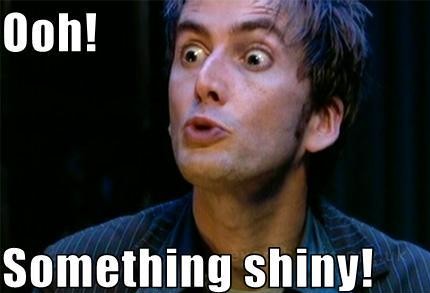 The ABCs of GMing
The ABCs of GMing
The ABCs of GMing is an ongoing series about the different skills and ideas needed to run a successful tabletop game.
Focus
If you have familiarity with any type of table games (not just RPGs), you know that the larger the player group, the longer the game takes. It’s inevitable that when friends socialize, discussions will be had, people will get distracted, and ultimately you’ll spend more time than you thought you would. This is just as true for playing a tabletop RPG as it is for throwing in your 5-6 player expansion for Settlers of Catan.
As a GM, however, you have to control the flow of your game. While some side discussion and social interaction is normal (and downright healthy for any gathering of friends), they can easily eat up time and distract you further from playing your game. While you shouldn’t be the GM gestapo, shutting down any conversation that isn’t related to the mission at hand, you need to balance that social chatter, and make sure there’s a healthy level of interaction without distracting from having a productive session.
Give Opportunities for Social Time

Setup would be so much easier if we could just get our hands on Felix’s Bag of Tricks…
You can’t expect your session to be nonstop gaming from start to finish. Therefore, schedule in breaks in your game. This gives your players a chance to not only digest what gaming you’ve done, but it also gives them a chance to step away and take a breather from the action. This helps your players keep their concentration when it comes time to get serious. There are plenty of opportunities to give your players some time off, such as:
- Set-Up Time: Any veteran GM will tell you that setting up for a game can be a lengthy process. You’ll have to unpack your personal Bag of Holding that includes a stack of gaming books, ten pounds of dice, a laptop, four different notebooks, pencils for everyone in your group plus 30 (because you bought that big pack of pencils saying ‘I’m going to need them!’), your GM screen, a sleeping cat, etc.
Instead of trying to get a jump start on your game by recapping what happened in the previous session while getting settled, let your players congregate around the table and unwind a bit. (Recapping can always be done as needed once you start.) In most cases, your players are coming into the session directly from work, school, or after a long week in general. They look forward to the game, but this is for entertainment and they should feel relaxed. Give them some time to mentally prepare for the game (or even start strategizing from where you left off last week).
- Cigarette Breaks: Statistically speaking, at some point you’re likely to have smokers in your games. To satiate their nicotine needs, have 5 to 15-minute breaks built in to your sessions. Not only does it give everyone a quick break, but it stops people from walking outside for a smoke while you’re smack in the middle of a major plot point.
- Two Hour Stretches: For diehard groups that like to game for hours on end, schedule regular breaks in the game to give players a chance to stand up and walk around. Many people spend their work day sitting at a desk and will appreciate stretching their legs. Even more extended periods of time sitting at a table could technically be considered torture. Get your players out of their chairs every couple hours.
- Planned Story Breaks: When you craft together your storylines, build in breaks in the action where it’s easy to stop for a few minutes. As much fun as it is to have non-stop action, make sure you’re allowing the game to have some naturally occurring breaks, instead of having to grind to a halt for one.
Keep Your Gamers in Check
We all know it’s pretty easy to get distracted from a task at hand. Add in a bunch of excited gamers consuming caffeine at alarming rates, and it’s just going to get worse. I’ve mentioned in previous articles that the GM needs to keep their players engaged, but keeping them focused goes beyond that.
While you too want to be laid-back and have fun, you will inevitably have to put a foot down to get your players’ attention – and hold it. Sometimes it’ll just be an off night, or maybe it’s been too long since you’ve had a break in events. Be mindful of when your players are being disrespectful, or when you may be wearing them down.
 Either way, when players stray from the game and start engaging in other conversations, everyone suffers. Remind them that you’re in the middle of something and you need their attention. If you still have problem players, take them aside and let them know that they are being detrimental to the group. It’s important that everyone at the table has a good time; don’t let one or two distracting players let everything get off course.
Either way, when players stray from the game and start engaging in other conversations, everyone suffers. Remind them that you’re in the middle of something and you need their attention. If you still have problem players, take them aside and let them know that they are being detrimental to the group. It’s important that everyone at the table has a good time; don’t let one or two distracting players let everything get off course.
Once Again, Know When to Call it
I know I made this point last time, but it’s worth restating. Energy levels aside, there will come a point where your players are suffering from information overload. (Also, possibly a sugar crash.) When focus is constantly getting shifted away from the game, take account of how long you’ve been playing. There’s always a point where your players become unfocused, be it from fatigue or getting overwhelmed. Know when to end for the day on a good note, and start planning ahead to pick things up again next session.
Next time, I’ll be talking about Generosity, and how sometimes the GM should really be a nice guy. Really! In the meantime, feel free to tell us about your own suggestions on energy on our forums!
